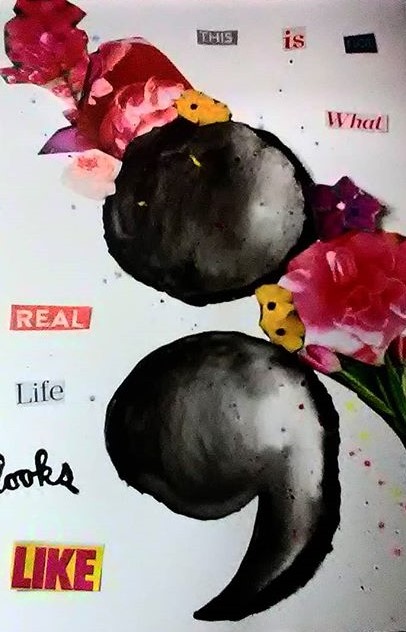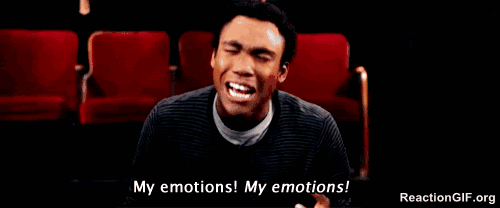Tag Archives: mental health
VOX 5: Five Ways to Break Barriers of Social Anxiety
Have you ever been nervous walking into a room crowded with people, feeling like all eyes are on you, and you’re thinking about the countless things they could be saying or thinking about you? Or when you have to present a project in front of the entire class and you can’t even get the words out your mouth? Your hands start to get clammy and sweaty, you’re trembling, and your classmates are staring you down like your mom does when you do something despicable. Your heart is racing, afraid of all the potential embarrassing outcomes. This is known as social anxiety. According to Psychology Today, “Social anxiety disorder, formerly referred to as social phobia, is an anxiety disorder characterized by overwhelming anxiety and excessive self-consciousness in everyday social situations.”
It is completely normal to be anxious in certain social situations, but if this is a continuous issue in your life you could possibly suffer from a social anxiety disorder. Having social anxiety is different from feeling awkward or nervous because the worry is present in every social situation and causes fear, self-consciousness, and intense distress. What differentiates a disorder from general nervousness is the feeling is overpowering and keeps people from their daily activities for six months or more.
In fifth grade, I personally was extremely self-conscious when meeting new people or simply getting called on in class by my teacher — not because I didn’t know the answer but because I allowed fear to overtake my mind. I used to think to myself, what if I start stuttering?’ or what if my voice sounds squeaky and everyone starts to laugh at me? I used to get bullied in elementary school about my appearance — being the light-skinned girl or wearing long hair. Being different made me stick out — so I knew I had to be strong and learn to overcome my fears.
I’ve learned that your mind can manipulate you into thinking you’re going to fail. You are your biggest enemy. But you can take authority over fear and overthinking, so you can fulfill your potential. Don’t make assumptions or start overthinking. Just do it! (Shia LaBeouf voice), and the weight will be lifted off your shoulders.
Here are five tips I’ve learned to keep from overthinking and keep my mind at ease. They might be helpful for you, too.
5 Ways to Overcome Social Anxiety
Know Yourself
Ever heard of the phrase “you have to love yourself before you can love anybody else?” Well, in order to be socially active you have to first learn who you are. Things like your interests or hobbies can help you engage in conversations or find people who can relate to you. For example, when I started my freshman year in high school, I wanted to surround myself with people who have the same drive and tenacity to excel in every aspect of school. Associating with people who carry the same goals as mine helped me achieve a 4.0 my first semester of high school. Find a friend you see shares your characteristics or traits of yourself. But in order to do this you have to understand who you are.
Breathing Exercises
Breathe in and breathe out. In very tense situations, sometimes you just need to take a deep breath and settle into the present. Breathing helps lower stress, easing your mind from any tension. This is definitely a great coping mechanism when you have intense anxiety, ultimately making it easier for you to be calm and collected in social situations. So next time anxiety tries to come your way, remember to breathe!
Don’t Have a Scooby -Doo Complex!
“Scooby-Doo Where Are You” is an American television series about a group of teenagers who solve paranormal mysteries. Every time Scooby-Doo encounters a so-called ghost or monster he immediately runs away, avoiding the whole situation. Eventually the Scooby gang solves the mystery and realizes the monster is actually a villain in disguise. Sometimes things are not what they seem. Our minds create this image of potential failure or embarrassment, and your immediate reaction could be to escape the situation as a whole. Instead, start writing daily affirmations in a journal expressing your confidence to help you achieve a brand new mind set. Don’t have a Scooby-Doo complex; be brave, face your fears.
Set Goals
 Don’t think your problems are going to be solved overnight; it takes baby steps. One of the factors that play a major role in anxiety is how you think others perceive you. As humans we tend to base our choices on how people view us. That means we have to be confident in who we are and hold our heads up high in the face of adversity. Take some time out of your day and write down some things you would like to accomplish. Start creating goals to become your best you.
Don’t think your problems are going to be solved overnight; it takes baby steps. One of the factors that play a major role in anxiety is how you think others perceive you. As humans we tend to base our choices on how people view us. That means we have to be confident in who we are and hold our heads up high in the face of adversity. Take some time out of your day and write down some things you would like to accomplish. Start creating goals to become your best you.
Seek Help or Support
If your social anxiety becomes too severe, please seek medical attention. Your doctor will be able to set you with Cognitive Behavioral Therapy or Psychotherapy. For those of you who are not aware of CBT is a therapy that deals with a person’s thoughts which can affect their behavior. Your doctor can recommend someone to help you. There are also many different resources in Atlanta such as the National Alliance on Mental Illness, Social Anxiety Association, and Anxiety and Depression Association of America. All of these provide support groups, helplines and educations for your benefit. The worst thing you could possibly do is suffer in silence, so let someone know. Maybe even consider sitting down talking to your parent or another family member about how this is a major problem in your life. Explain to them how it affects you on a daily basis, and I’m positive they will help you!
I also have an interview with a mental health professional Shy Powe as well on social anxiety. Click below to listen.
 You are invited to join VOX ATL’s teens at our annual VOX-A-PALOOZA celebration where we will highlight all of the work that has been created this semester as well as give you an opportunity to meet the teens themselves. You will also be one of the first to receive the newest print editon of VOX Investigates: Mental Health! RSVP HERE.
You are invited to join VOX ATL’s teens at our annual VOX-A-PALOOZA celebration where we will highlight all of the work that has been created this semester as well as give you an opportunity to meet the teens themselves. You will also be one of the first to receive the newest print editon of VOX Investigates: Mental Health! RSVP HERE.
Yes, I Struggle with Depression. But I’m a Survivor, Not a Victim.
How do I tell this story?
On January 10, 2018, I’m sitting under dim, buzzing fluorescent lights in a bare, windowless room wearing a hospital gown that comes under my knees. The psych ward. Nothing about this is normal. There are people screaming. But I just sit there because I’m tired, and I’m numb.
In the morning, two paramedics who tell me they’ve been awake for 24 hours will load me up into an ambulance and take me to Lakeview Behavioral Health Center, where I will spend the next 96 hours. It will feel like an eternity of locked doors, air hockey with suicidal 12-year-olds, and numbness. But it won’t be forever.
I want to tell my past self this. But for now, she is going to be sitting alone in that uncomfortable hospital bed in the blue room, thinking.
My name is Maya. This is VOX ATL. And here’s my story.
I should probably start with May 4, 2017, when a little journalist with a big dream published an article entitled “A Self-Care Toolbox for Stressful Transitions.” The opening sentence reads, “Change is tough but necessary. If I could take one lesson from the craziness of being a teen halfway between a world that held my hand and sheltered me, and a world that expected me to wake up at 5:30 every morning, drink coffee and show up, this would be it.
Excerpt:
“As I graduate high school this spring and look to a future of more caffeine, independence and quirky new classmates, I want to simultaneously drive through a long tunnel to the sound of David Bowie’s ‘Heroes’ donning my cap and gown — and dunk my head into a vat of icy water and scream from the stress of it all. I think I am not alone in this, which is why I went in search of strategies for managing transition stress. This is what I found.”
And I interviewed a bunch of folks, mostly valedictorians who graduated from the high school where my grandmother taught who, like me, had abusive relationships with perfectionism. The article suggested many helpful tools, like affirmations, community, and asking for help.
I was right to anticipate that the transition would not be easy and seek out ways to prepare for it, but part of that anticipation planted a seed of self-doubt in me that became this monster of a self-fulfilling prophecy. Graduation day was 13 days after my article was published online. And graduation day was great. Graduation day was a dream come true. On graduation day, I gave the valedictorians’ speech. There were hugs, so many hugs, and flowers and scholarships and my family threw me a party. Then that night, I bawled my eyes out because where the heck was I supposed to go from there? I can’t say I was the most popular girl in high school (in fact, people often mistook me for my best friend who looks nothing like me), but at least I had clout as the senior that all the teachers adored. Who was I now? What was I supposed to do?
And then, like a freakin’ steam engine, life just kept chugging along.
What happens in the mind manifests itself in the body if you let it. I closed my eyes and imagined my best friend from high school, who ended up going to the same college as me, finding more compatible friends and drifting away and in my mind, it happened. I imagined flunking my first semester, and I nearly did. (By the way, in case you’re a rising freshman and worried about this— it’s totally normal if your college grades don’t match your high school grades first semester. Totally normal). I imagined my own death, but .. .I survived. I’m here.
In the months after I get out of the hospital, I experiment a few times with taking a couple more pills than I am supposed to. I hold scissor blades to the inside of my left palm, but don’t break skin. I once accidentally sedate myself for a day by intentionally taking too many anti-anxiety pills.
How do I tell this story that makes up just one part of the smorgasbord that is my life? Do I attach a zoom lens or do I want more distance than that? Do I use flash and if so, what do I highlight? What do I crop out? For October 17, 2017, for example— just the one day— do I put focus on the first anti-anxiety pill I ever take (taken the night before my very first real party with alcohol and everything) or do I put focus on the extremely purple lipstick I pick up from the drugstore this night or do I focus on how the firefighters laugh at my panic attack the next morning when I think I am dying or do I focus on my friend when she is here right in front of me acting as photographer of every dress I try on for this party so we can compare them later? When love and hate and insecurity and power and community and beauty and depression and pain and stress and fun and joy all exist in the same 24 hours and in the same body, how do you pick up the pieces and make a story out of them?
In the end, the most helpful story for me is the story of post-traumatic growth. We’ve all heard of post-traumatic stress, but when you have the resources in place and you’re willing to work with them, sometimes trauma can be the soil you grow them. This is what I did, and it is what I continue to do, and it’s the story I have to tell myself to get myself out of bed every morning.
With that being said … I don’t know where or how I came across the semicolon.

Did I find Project Semicolon during the early days of copious research about my depression diagnosis? Did I notice the symbol on some 12-year-old’s wrist as we huddled over our coloring pages? Or has the semicolon always been there, branded in my brain like an anthem blaring louder than anything else?
I used to see myself as a victim.
I felt like things were constantly falling apart.
There was no way I could survive the pain.
But with the help of therapy, medication, and a mixed bag of coping mechanisms that included everything from random dance parties to Smells Like Teen Spirit by Nirvana to making bad watercolor art, I did.
And I do.
And so will you.
As soon as I woke up from my 16-hour nap induced by too many anti-anxiety pills, I picked up the marker in the floor of my bedroom and scribbled that semicolon onto my wrist. Deeper and deeper, like I could brand the will to live into my skin. I continued to draw semicolons on my wrist every time I felt bad. Then I put a semicolon on a small piece of fabric to pin to my shirt, to paper, and into my poems. Everywhere. Unlike the comma, the semicolon allows for a short breath before we continue, but it is never the end. I’m 18 years old. I’m still just a wee sentence fragment and the semicolon hangs there between all the amazing things I am and all the phenomenal things I could be.
I haven’t “overcome” anything. Nobody swooped in to save me. I saved and I am saving myself one day at a time and I am grateful for every chance I get to be here— to play with my dog, to argue with my brother, to eat bad cheese, to drag my friends onto the ice skating rink even if they really don’t want to.

Your emotions and thoughts are a natural part of you, even the scary ones, so to try and silence them would be like amputating a limb.
But your emotions don’t get to control you. You are here.
It’s your choice to get into that studio, to trust your voice and what it has to say, and press record.
You can reach the National Suicide Prevention Hotline at 1-800-273-8255 or by texting HOME to 741741. Your Life Your Voice is another great resource just for teens that you can reach by email (yourlifeyourvoice@boystown.org), phone (1-800-448-3000), or text (text VOICE to 20121). You can contact YLYV for any reason, not just when you are in a mental health crisis.
Maya, 18, hopes you will share this. Facebook, Instagram, carrier pigeon, word-of-mouth. Print it out and stuff it in the collar of your timeshare cat. Airplane messages in the sky work, too.




